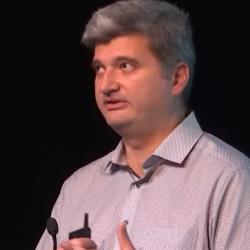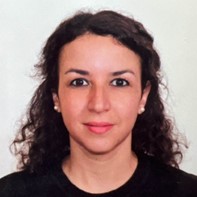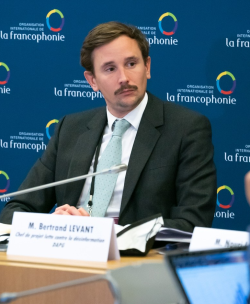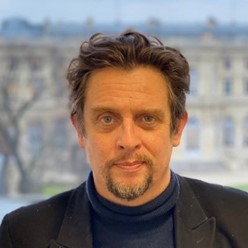Intelligence artificielle et désinformation: des solutions techniques et politiques / Artificial intelligence and disinformation: technical and political solutions
Mission permanente de Belgique - Wallonie-Bruxelles à Genève
Session 312
(English below)
Plus de 70 élections sont prévues en 2024 à travers le monde, et nous savons que l'IA aura un impact sur ces élections et sur la démocratie en générale. La désinformation est l'un des risques associés à l'IA dans ce contexte. De même, l'IA est activement utilisée dans le cadre de conflits, qui sont comme des laboratoires de ce qui pourrait ce passer dans nos sociétés de manière générale. Cet atelier analysera les risques pour la démocratie et dans les conflits, et tentera de mettre en lumière quelques solutions. Des solutions techniques seront proposées par un ingénieur, les premières règlementations mises en place seront décryptées par une juriste, et les programmes d'information et de soutien des deux organisations internationales seront également présentés (CICR et OIF).
More than 70 elections are scheduled for 2024 around the world, and we know that AI will have an impact on these elections and on democracy in general. Disinformation is one of the risks associated with AI in this context. AI is also actively used in conflicts, which are like laboratories for what could happen in our societies in general. This workshop will analyze the risks to democracy and conflict, and attempt to highlight some solutions. Technical solutions will be proposed by an engineer, the first regulations put in place will be deciphered by a legal expert, and the information and support programs of two international organizations (ICRC and Francophonie) will also be presented.
This session will be held in French with simultaneous interpretation to English.

Matei Mancas est titulaire d'un doctorat en sciences appliquées de l'Université de Mons (UMONS), en Belgique. Il travaille sur la modélisation de l'attention visuelle humaine depuis sa thèse de doctorat et se concentre sur l'IA appliquée aux humains.
Mancas fait partie du projet européen AI4DEBUNK (https://ai4debunk.eu/) qui se concentre sur l'utilisation des sciences sociales et des technologies pour lutter contre les fausses nouvelles. UMONS participe à la partie technique du projet.
Il a publié plusieurs dizaines d'articles dans des conférences et des revues internationales à comité de lecture et a édité un livre intitulé « From Human Attention to Computational Attention : A Multidisciplinary Approach » publié par Springer Series in Cognitive and Neural Systems.
Google Scholar : https://scholar.google.com/citations?user=glHMu3AAAAAJ&hl=en
Dr. Matei Mancas holds a PhD in applied sciences from the University Of Mons (UMONS), Belgium. He works on human visual attention modelling since his doctoral thesis and he is focusing on AI applied to humans.
Dr. Mancas is part of the EU project AI4DENUK (https://ai4debunk.eu/) which focuses on the use of both social sciences and technologies to combat fake news. UMONS is involved in the technical part of the project.
He has published several dozen of articles in peer reviewed international conferences and journals, and edited a book entitled "From Human Attention to Computational Attention: A Multidisciplinary Approach" published by Springer Series in Cognitive and Neural Systems.
Google Scholar : https://scholar.google.com/citations?user=glHMu3AAAAAJ&hl=en

Aline Nardi est assistante à l'Université de Namur, en Belgique, en Droit constitutionnel et en Sources et principes du droit. Elle est également chercheuse au NaDI-CRIDS (Centre de recherche sur l'information, le droit et la société). Ses principaux domaines d'expertise sont le droit des TIC, les droits fondamentaux, l’e-gouvernement et le droit de la concurrence. Ses recherches actuelles portent sur l'utilisation de l'intelligence artificielle par les États et les systèmes d’intelligence artificielle générative.
Aline Nardi is an assistant lecturer in Constitutional Law and Sources and Principles of Law at the University of Namur, Belgium. She is also a researcher at NaDI-CRIDS (Centre de recherche sur l'information, le droit et la société). Her main areas of expertise are ICT law, fundamental rights, e-government and competition law. Her current research focuses on the use of artificial intelligence by governments and generative artificial intelligence systems.

Philippe Stoll est le délégué senior en techplomatie au Comité international de la Croix-Rouge (CICR). Son travail se situe à l’intersection entre le secteur privé, le monde humanitaire et académique ainsi que les gouvernements afin de mieux protéger les civils dans les zones de conflits des risques et conséquence des technologies numérique tels que cyber-attaques, discours de haine en ligne, armes autonomes, intelligence artificielle, etc. Il se focalise aussi sur l’utilisation éthique et raisonnée des technologies par les humanitaires. Co-créateur de l’installation https://digital-dilemmas.icrc.org, il contribue à mettre en lumière la question des risques numériques encourus par les communautés victimes de conflits.
Au cours de ses 20 années de carrière au CICR, il a géré les communications stratégiques et publiques de l’organisation ainsi que l’engagement avec les personnes affectées, en plus d’effectuer des missions au Sierra Leone, en Israël et dans les territoires occupés, ainsi qu’en Inde. Il s’est aussi rendu pour de courtes périodes en Afghanistan, aux Philippines, au Myanmar, au Kenya et récemment en Ukraine.
Philippe Stoll est titulaire d’un Master en économie de l’Université de Genève et d’un RP en journalisme du Centre Romand de Formation des Journalistes à Lausanne.
Philippe Stoll is the senior delegate for techplomacy at the International Committee of the Red Cross (ICRC). His work lies at the intersection between the private sector, the humanitarian and academic worlds and governments, with the aim of better protecting civilians in conflict zones from the risks and consequences of digital technologies such as cyber-attacks, online hate speech, autonomous weapons, artificial intelligence, etc. He also focuses on the ethical and reasoned use of technologies by humanitarians. Co-creator of the https://digital-dilemmas.icrc.org installation, he is helping to highlight the digital risks faced by communities affected by conflict.
During his 20-year career with the ICRC, he has managed the organisation's strategic and public communications and engagement with affected people, as well as carrying out missions in Sierra Leone, Israel and the Occupied Territories, and India. He has also spent short periods in Afghanistan, the Philippines, Myanmar, Kenya and recently Ukraine.
Philippe Stoll holds a Master's degree in economics from the University of Geneva and a PR in journalism from the Centre Romand de Formation des Journalistes in Lausanne.

(to be confirmed)
Cheffe du Pôle des droits de l’homme au sein de la Mission Permanente du Maroc à Genève, Miriam Ragala a débuté sa carrière au Ministère des Affaires Étrangères et de la Coopération Internationale du Maroc en 2010. Elle y a exercé plusieurs fonctions, notamment celles de cheffe du service Extrême Orient (2015-2018) et de conseillère auprès du ministre délégué (2018-2021). Elle a également été conseillère politique à l’Ambassade du Maroc au Brésil (2013-2015).
Née à Stockholm, Miriam a vécu dans de nombreux pays et parle couramment cinq langues. Rapidement passionnée par la diplomatie, elle obtient en 2009 son diplôme de maîtrise en Études internationales de l’Université de Montréal.
Head of the Human Rights Unit at Morocco's Permanent Mission in Geneva, Miriam Ragala began her career at Morocco's Ministry of Foreign Affairs and International Cooperation in 2010. She has held several positions there, including Head of the Far East Department (2015-2018) and Advisor to the Minister Delegate (2018-2021). She was also Political Counsellor at the Moroccan Embassy in Brazil (2013-2015).
Born in Stockholm, Miriam has lived in many countries and is fluent in five languages. She quickly developed a passion for diplomacy, and in 2009 obtained her Master's degree in International Studies from the Université de Montréal.

Bertrand LEVANT est Chef du pôle Intégrité de l’information à la Direction des Affaires politiques et de la gouvernance démocratique (DAPG) de l’Organisation internationale de la Francophonie (OIF) où il travaille depuis près de 10 ans dans les domaines des médias, de leur régulation et de la liberté d’expression. Diplômé en relations internationales, en communication et en études européennes, il a été auparavant journaliste puis conseiller au Conseil supérieur de l’audiovisuel (CSA) de la Fédération Wallonie-Bruxelles (Belgique).
Bertrand LEVANT is Head of the Information Integrity Unit at the Political Affairs and Democratic Governance Directorate (DAPG) of the Organisation internationale de la Francophonie (OIF), where he has been working for nearly 10 years in the fields of media, media regulation and freedom of expression. A graduate in international relations, communications and European studies, he was previously a journalist and then advisor to the Conseil supérieur de l'audiovisuel (CSA) of the Wallonia-Brussels Federation (Belgium).

Ancien élève de l’École normale supérieure, Henri Verdier fut le fondateur et le directeur général de la société Odile Jacob Multimédia. En 2007, il rejoint Lagardère Active comme directeur chargé de l’innovation. En 2009, il rejoint l’Institut Télécom comme directeur de la prospective, chargé de la création du Think Tank « Futur numérique » (Fondation-telecom). Il est ensuite cofondateur, avec Jean-Michel Lasry, Pierre-Louis Lions et Olivier Guéant, de la société MFG-Labs, qu’il quitte en 2012, et qui est acquise par Havas Media en mai 2013.
Membre fondateur du pôle de compétitivité Cap Digital, il en exerça la vice-présidence de 2006 à 2008, avant d’en être élu président du Conseil d’administration de 2008 à janvier 2013.
Il dirige, dès janvier 2013, Etalab, mission chargée de l’ouverture des données publiques sous l’autorité du Premier ministre. Sous sa direction, Etalab développe une nouvelle version, inaugurée le 18 décembre 2013, du portail d’open data français « data.gouv.fr », qui héberge de nombreuses données publiques et qui est le premier portail d’open data au monde à accueillir les données et les réutilisations des citoyens.
Henri Verdier est aussi membre du conseil scientifique de l’Institut Mines-Télécom, ainsi que du comité de prospective de l’ARCEP et du comité de prospective de la CNIL.
Le 19 septembre 2014, il est nommé Administrateur Général des Données par le gouvernement Français. Un an plus tard, le 23 septembre 2015, Henri Verdier est nommé, en Conseil des ministres, directeur interministériel du numérique et du système d’information et de communication de l’État (DINSIC). Le 15 novembre 2018 il est nommé en Conseil des Ministres Ambassadeur pour le Numérique.
A former student at the École normale supérieure, Henri Verdier was founder and CEO of Odile Jacob Multimédia. In 2007, he joined Lagardère Active as Director of Innovation. In 2009, he joined Institut Télécom as Director of Foresight, in charge of creating the “Digital Future” Think Tank (Fondation-telecom). Together with Jean-Michel Lasry, Pierre-Louis Lions and Olivier Guéant, he then co-founded MFG-Labs, which he left in 2012 and which was acquired by Havas Media in May 2013.
A founding member of the Cap Digital competitiveness cluster, he served as Vice-Chair from 2006 to 2008, before being elected Chair of the Board from 2008 to January 2013.
In January 2013, he became head of Etalab, the mission responsible for opening up public data under the authority of the Prime Minister. Under his direction, Etalab developed a new version, inaugurated on December 18, 2013, of the French open data portal “data.gouv.fr”, which hosts a wealth of public data and is the first open data portal in the world to welcome citizen data and reuse.
Henri Verdier is also a member of the scientific council of the Institut Mines-Télécom, as well as the ARCEP foresight committee and the CNIL foresight committee.
On September 19, 2014, he was appointed General Data Administrator by the French government. A year later, on September 23, 2015, Henri Verdier was appointed by the Council of Ministers as Interministerial Director of the State's Digital, Information and Communication System (DINSIC). On November 15, 2018, he was appointed by the Council of Ministers as Ambassador for the Digital Affairs.
-
 C1. The role of governments and all stakeholders in the promotion of ICTs for development
C1. The role of governments and all stakeholders in the promotion of ICTs for development
-
 C4. Capacity building
C4. Capacity building
-
 C5. Building confidence and security in use of ICTs
C5. Building confidence and security in use of ICTs
-
 C9. Media
C9. Media
This session is mainly related to the WSIS Action line C9 Media.
It deals with AI and disinformation, which can disrupt trust in digital technologies and online media and other online sources of information.
It focuses on providing solutions to this issue: looking at technical solutions, as well as legal solutions, and supporting programmes from international organisations.
-
 Goal 9: Build resilient infrastructure, promote sustainable industrialization and foster innovation
Goal 9: Build resilient infrastructure, promote sustainable industrialization and foster innovation
-
 Goal 16: Promote just, peaceful and inclusive societies
Goal 16: Promote just, peaceful and inclusive societies
This session is mainly linked to SDG 16, as we will talk about the use of AI for disinformation in conflict areas, as well as the impact of AI and disinformation on the fabric of peaceful democracies.